Empirical Research Review: Breaking Bad News in Healthcare Settings
VerifiedAdded on 2022/12/01
|12
|1320
|455
Report
AI Summary
This report provides a comprehensive review of empirical research focusing on the challenges experienced by nurses and healthcare workers when delivering bad news to patients and their families. The research employs a qualitative methodology, analyzing real-world scenarios and experiences of healthcare professionals in various settings. The methodology's appropriateness, clarity, and potential limitations, such as the geographical restriction of participants and the reliance on questionnaires, are thoroughly examined. Alternative methodologies, like in-depth interviews, are also considered. The report highlights key themes, including institutional challenges, patient and family reactions, and the need for effective communication skills. It concludes with implications for future research and practice, emphasizing the importance of developing effective communication channels and incorporating diverse perspectives to improve patient care and support healthcare professionals in these difficult situations. The report also discusses the significance of combined data collection methods for comprehensive insights.
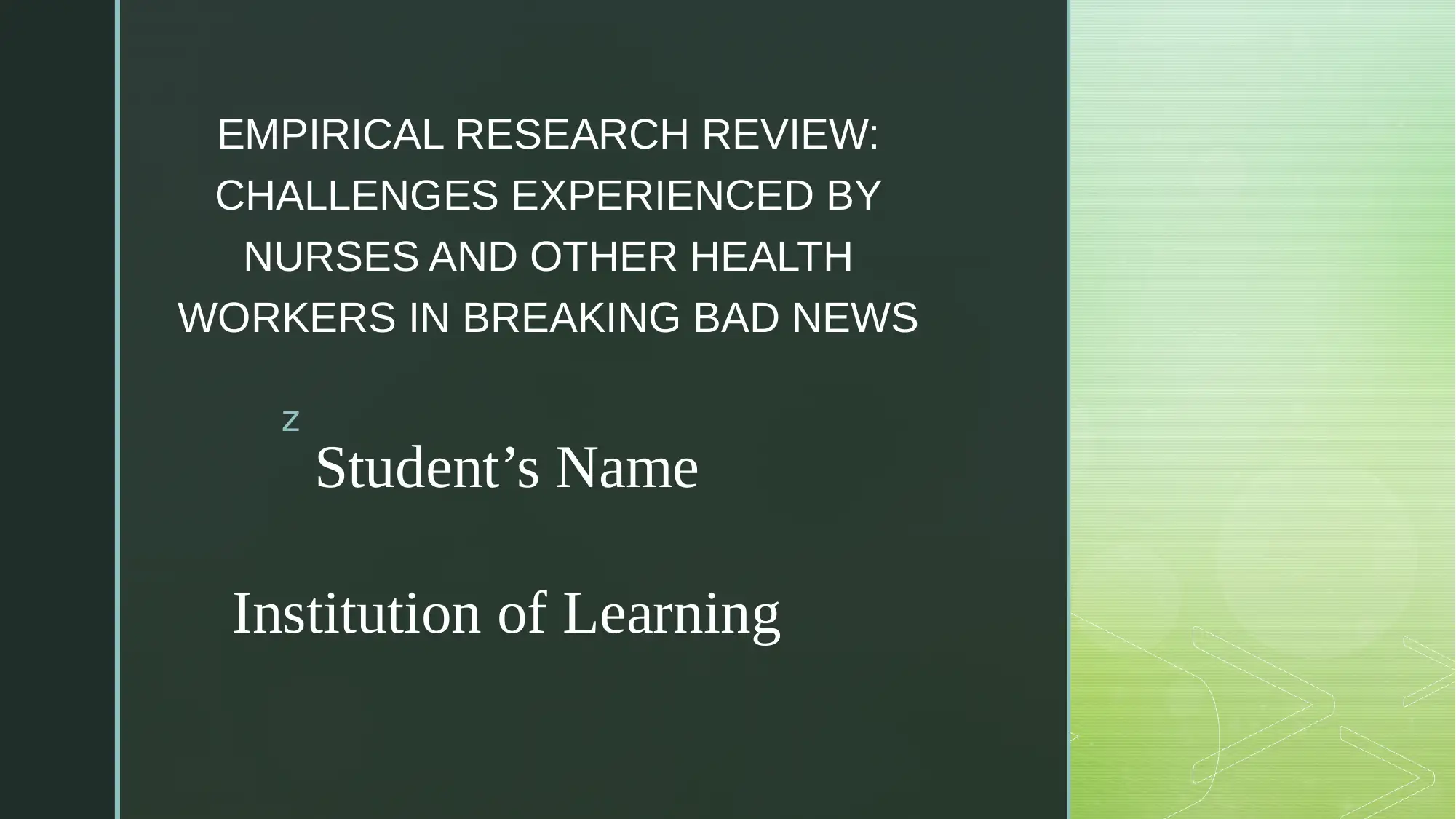
z
Student’s Name
Institution of Learning
EMPIRICAL RESEARCH REVIEW:
CHALLENGES EXPERIENCED BY
NURSES AND OTHER HEALTH
WORKERS IN BREAKING BAD NEWS
Student’s Name
Institution of Learning
EMPIRICAL RESEARCH REVIEW:
CHALLENGES EXPERIENCED BY
NURSES AND OTHER HEALTH
WORKERS IN BREAKING BAD NEWS
Paraphrase This Document
Need a fresh take? Get an instant paraphrase of this document with our AI Paraphraser
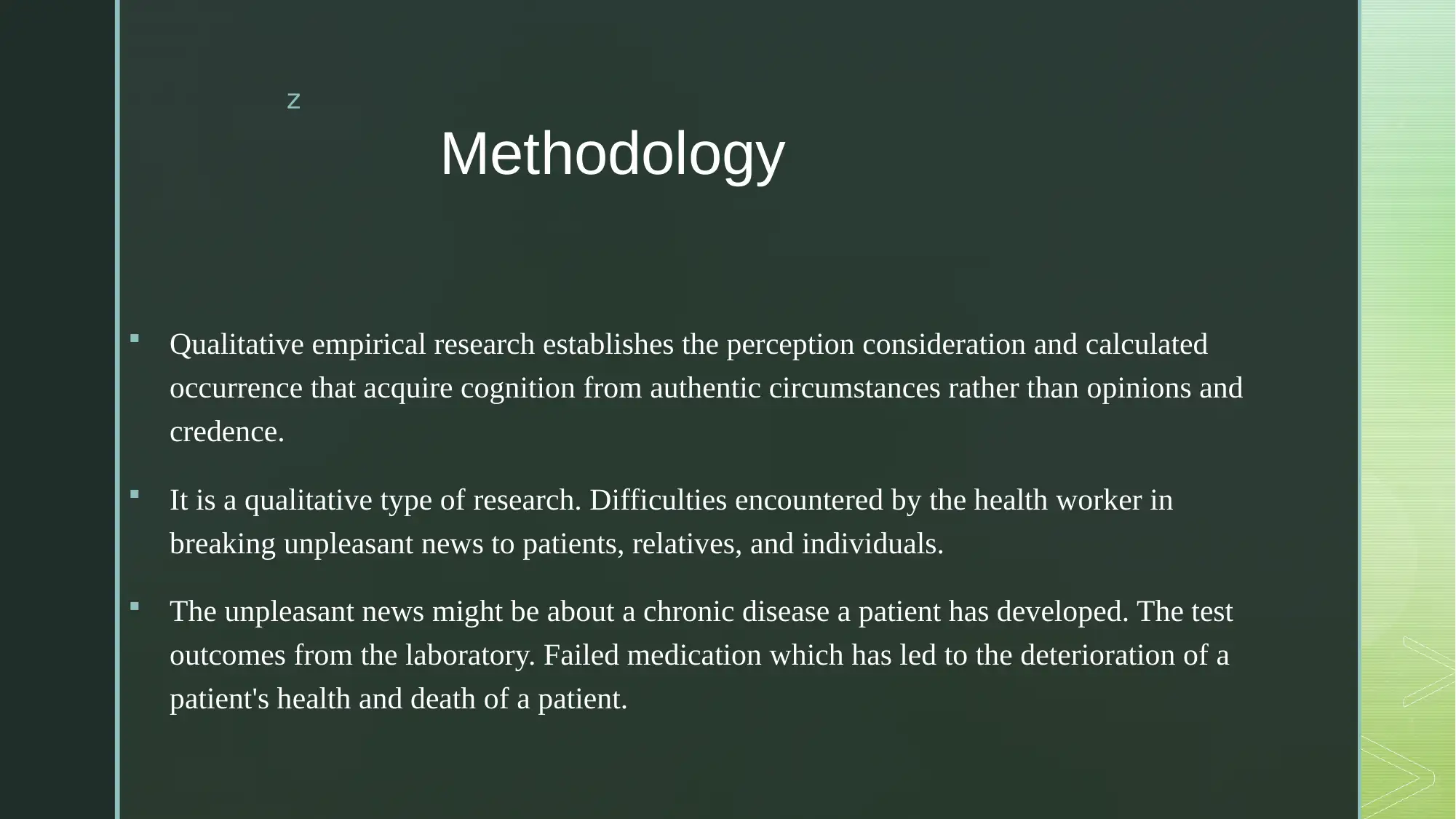
z
Methodology
Qualitative empirical research establishes the perception consideration and calculated
occurrence that acquire cognition from authentic circumstances rather than opinions and
credence.
It is a qualitative type of research. Difficulties encountered by the health worker in
breaking unpleasant news to patients, relatives, and individuals.
The unpleasant news might be about a chronic disease a patient has developed. The test
outcomes from the laboratory. Failed medication which has led to the deterioration of a
patient's health and death of a patient.
Methodology
Qualitative empirical research establishes the perception consideration and calculated
occurrence that acquire cognition from authentic circumstances rather than opinions and
credence.
It is a qualitative type of research. Difficulties encountered by the health worker in
breaking unpleasant news to patients, relatives, and individuals.
The unpleasant news might be about a chronic disease a patient has developed. The test
outcomes from the laboratory. Failed medication which has led to the deterioration of a
patient's health and death of a patient.
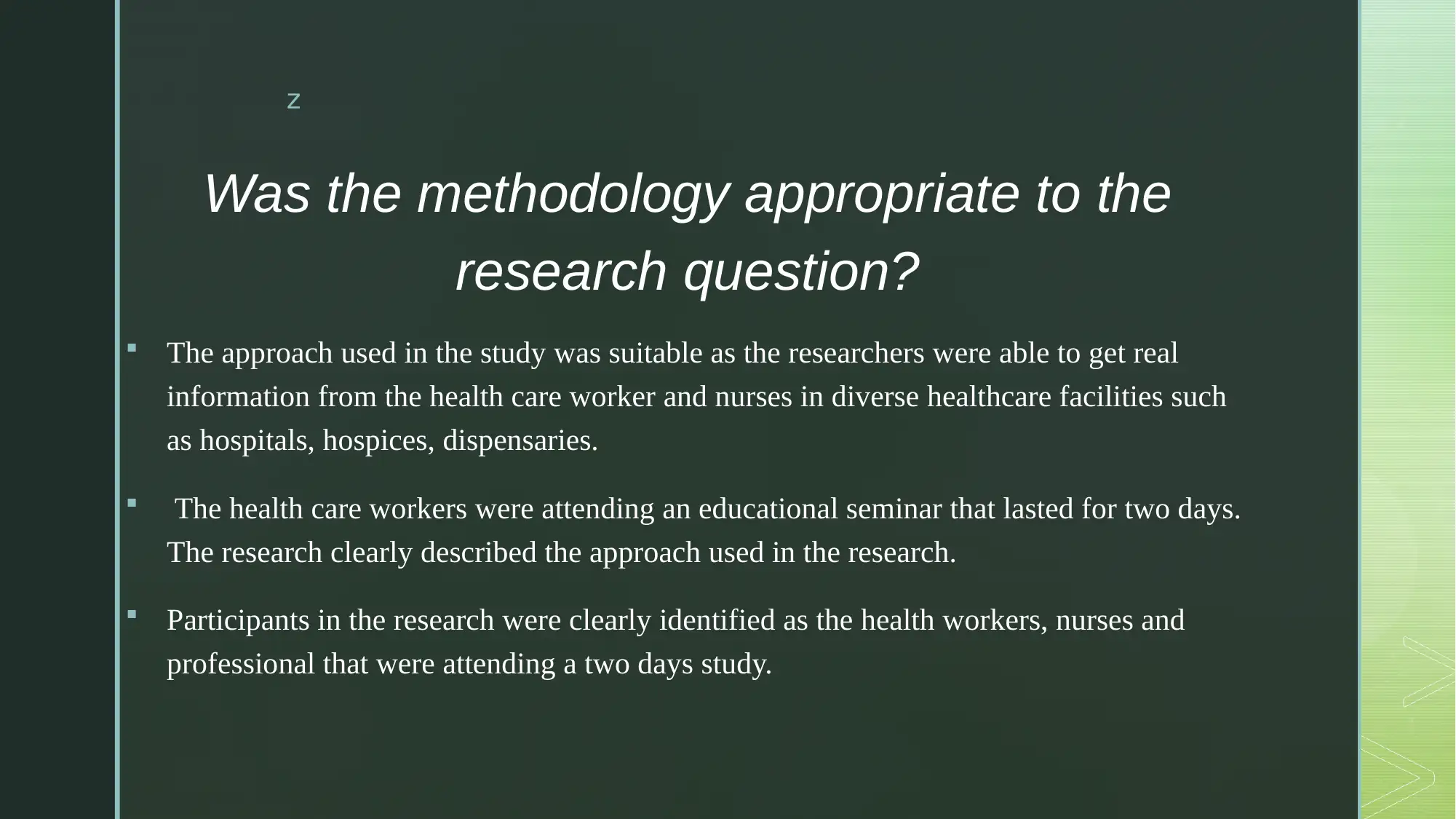
z
Was the methodology appropriate to the
research question?
The approach used in the study was suitable as the researchers were able to get real
information from the health care worker and nurses in diverse healthcare facilities such
as hospitals, hospices, dispensaries.
The health care workers were attending an educational seminar that lasted for two days.
The research clearly described the approach used in the research.
Participants in the research were clearly identified as the health workers, nurses and
professional that were attending a two days study.
Was the methodology appropriate to the
research question?
The approach used in the study was suitable as the researchers were able to get real
information from the health care worker and nurses in diverse healthcare facilities such
as hospitals, hospices, dispensaries.
The health care workers were attending an educational seminar that lasted for two days.
The research clearly described the approach used in the research.
Participants in the research were clearly identified as the health workers, nurses and
professional that were attending a two days study.
⊘ This is a preview!⊘
Do you want full access?
Subscribe today to unlock all pages.

Trusted by 1+ million students worldwide
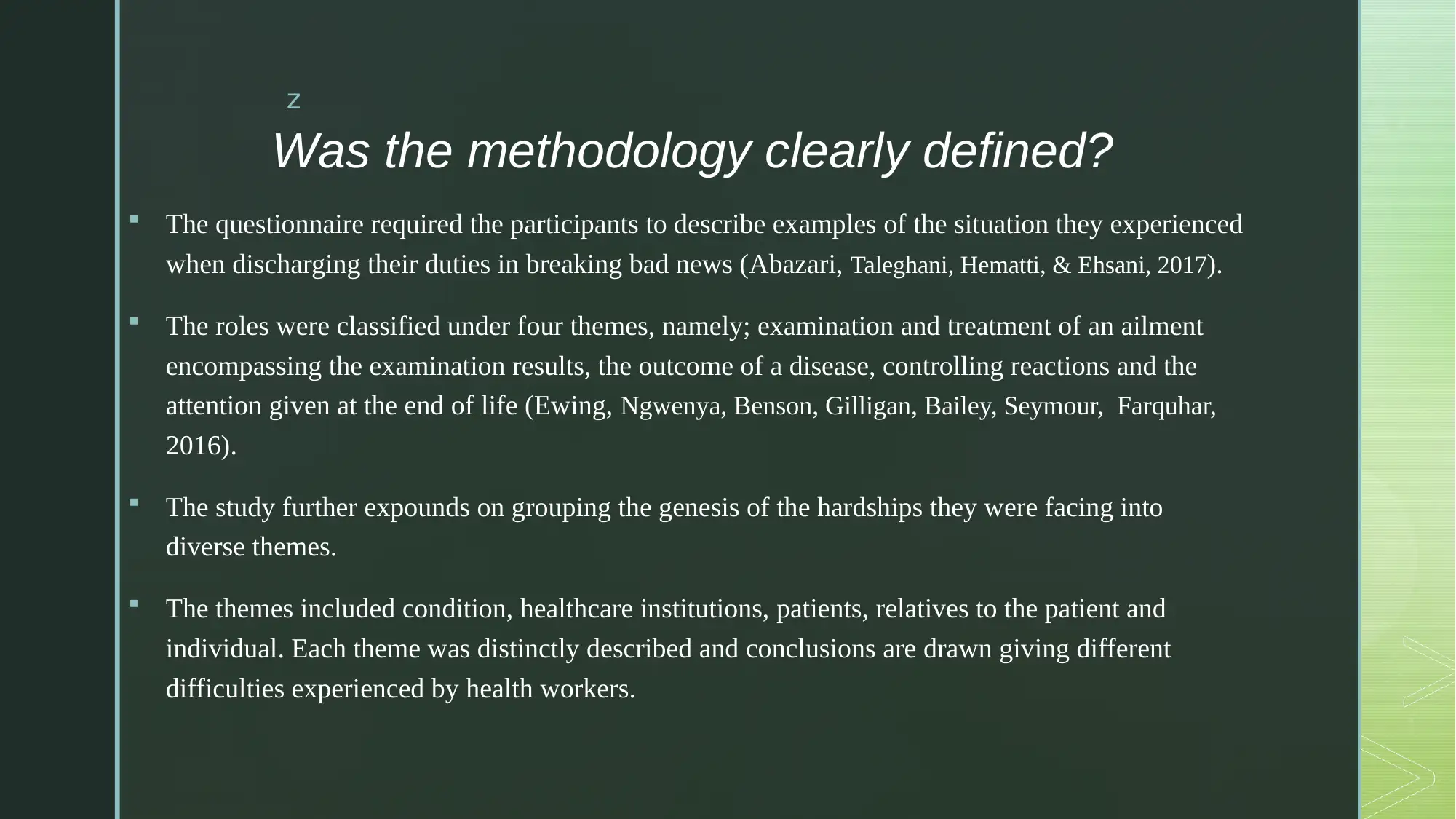
z
Was the methodology clearly defined?
The questionnaire required the participants to describe examples of the situation they experienced
when discharging their duties in breaking bad news (Abazari, Taleghani, Hematti, & Ehsani, 2017).
The roles were classified under four themes, namely; examination and treatment of an ailment
encompassing the examination results, the outcome of a disease, controlling reactions and the
attention given at the end of life (Ewing, Ngwenya, Benson, Gilligan, Bailey, Seymour, Farquhar,
2016).
The study further expounds on grouping the genesis of the hardships they were facing into
diverse themes.
The themes included condition, healthcare institutions, patients, relatives to the patient and
individual. Each theme was distinctly described and conclusions are drawn giving different
difficulties experienced by health workers.
Was the methodology clearly defined?
The questionnaire required the participants to describe examples of the situation they experienced
when discharging their duties in breaking bad news (Abazari, Taleghani, Hematti, & Ehsani, 2017).
The roles were classified under four themes, namely; examination and treatment of an ailment
encompassing the examination results, the outcome of a disease, controlling reactions and the
attention given at the end of life (Ewing, Ngwenya, Benson, Gilligan, Bailey, Seymour, Farquhar,
2016).
The study further expounds on grouping the genesis of the hardships they were facing into
diverse themes.
The themes included condition, healthcare institutions, patients, relatives to the patient and
individual. Each theme was distinctly described and conclusions are drawn giving different
difficulties experienced by health workers.
Paraphrase This Document
Need a fresh take? Get an instant paraphrase of this document with our AI Paraphraser
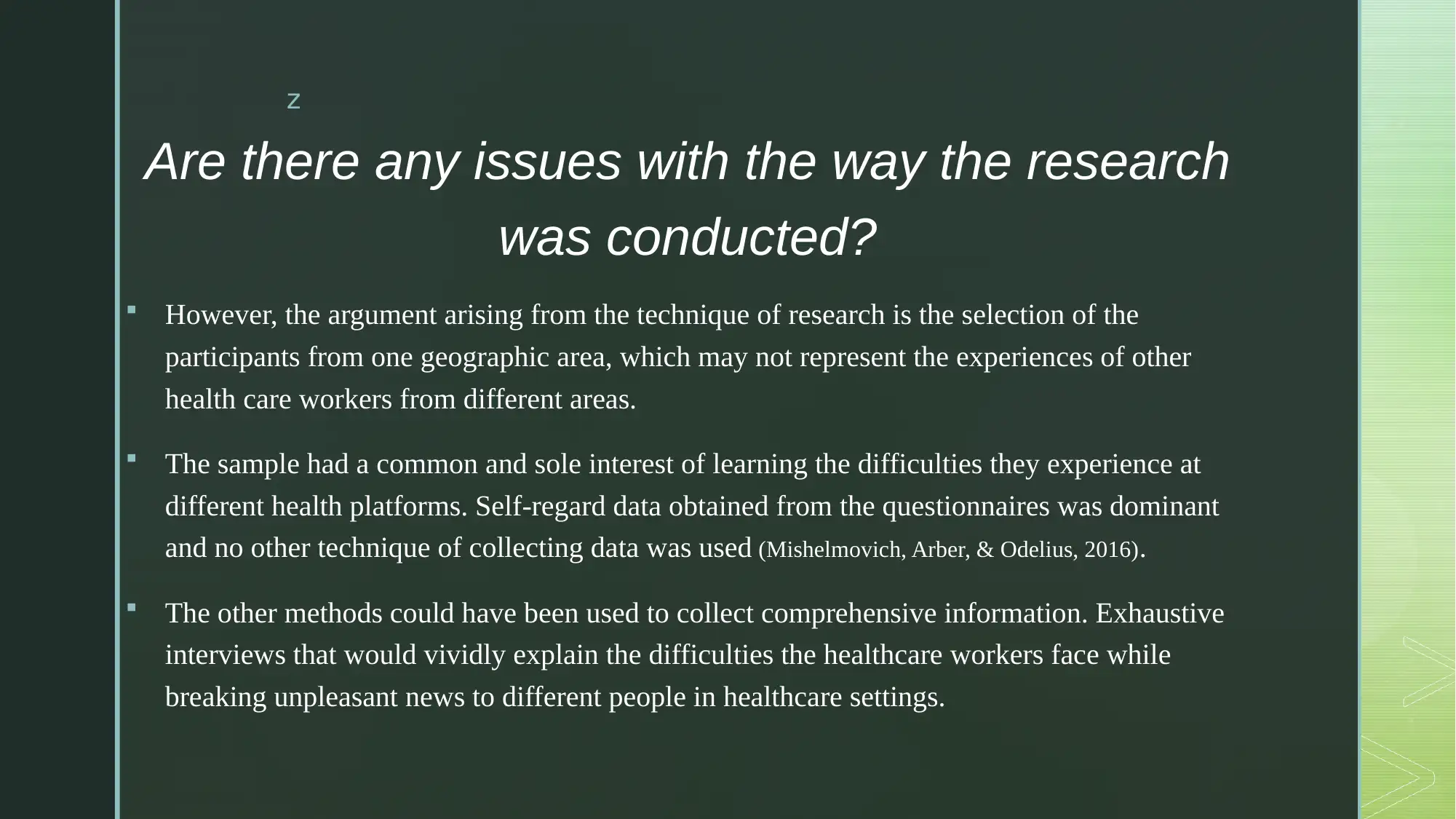
z
Are there any issues with the way the research
was conducted?
However, the argument arising from the technique of research is the selection of the
participants from one geographic area, which may not represent the experiences of other
health care workers from different areas.
The sample had a common and sole interest of learning the difficulties they experience at
different health platforms. Self-regard data obtained from the questionnaires was dominant
and no other technique of collecting data was used (Mishelmovich, Arber, & Odelius, 2016).
The other methods could have been used to collect comprehensive information. Exhaustive
interviews that would vividly explain the difficulties the healthcare workers face while
breaking unpleasant news to different people in healthcare settings.
Are there any issues with the way the research
was conducted?
However, the argument arising from the technique of research is the selection of the
participants from one geographic area, which may not represent the experiences of other
health care workers from different areas.
The sample had a common and sole interest of learning the difficulties they experience at
different health platforms. Self-regard data obtained from the questionnaires was dominant
and no other technique of collecting data was used (Mishelmovich, Arber, & Odelius, 2016).
The other methods could have been used to collect comprehensive information. Exhaustive
interviews that would vividly explain the difficulties the healthcare workers face while
breaking unpleasant news to different people in healthcare settings.
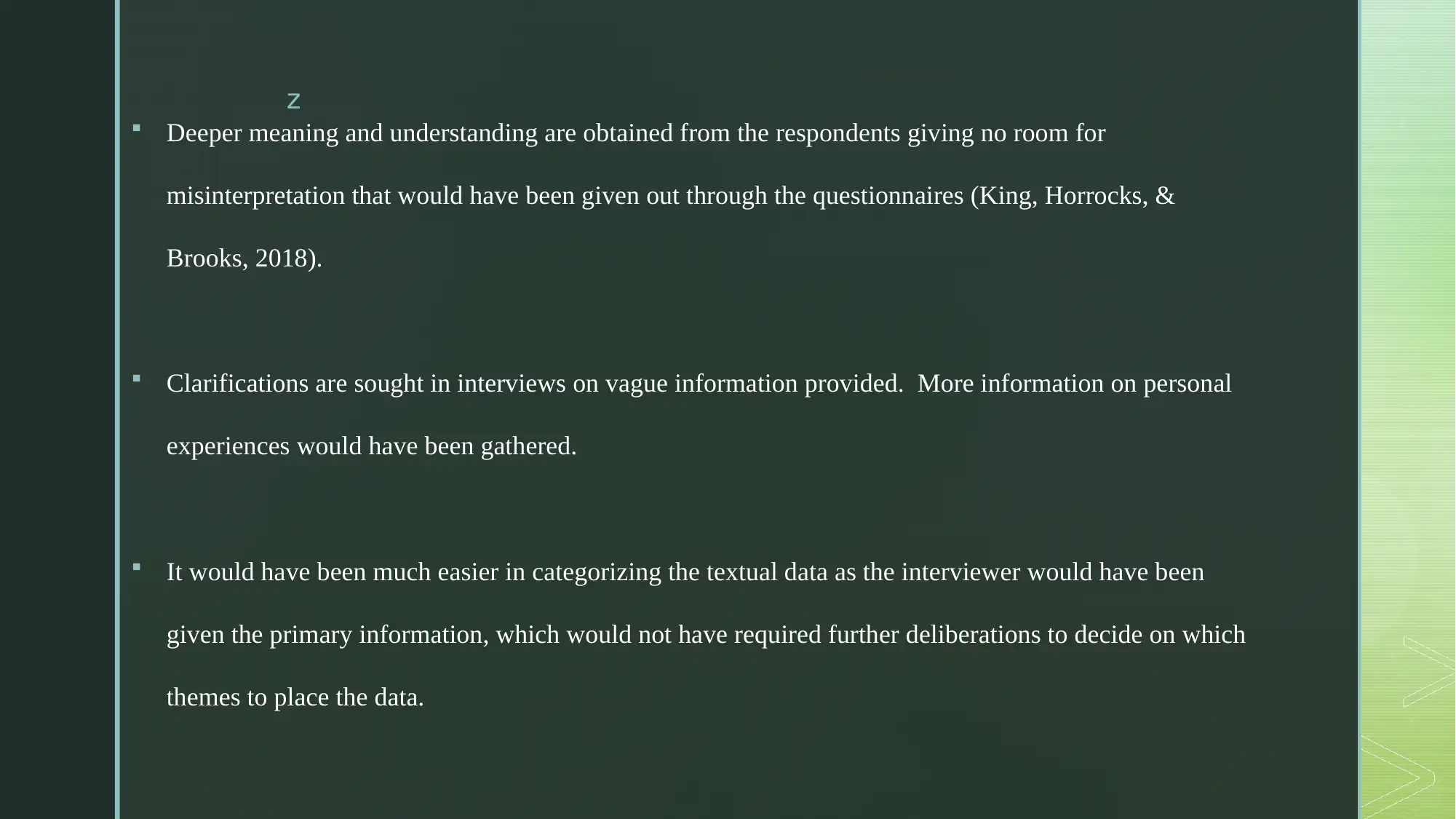
z
Deeper meaning and understanding are obtained from the respondents giving no room for
misinterpretation that would have been given out through the questionnaires (King, Horrocks, &
Brooks, 2018).
Clarifications are sought in interviews on vague information provided. More information on personal
experiences would have been gathered.
It would have been much easier in categorizing the textual data as the interviewer would have been
given the primary information, which would not have required further deliberations to decide on which
themes to place the data.
Deeper meaning and understanding are obtained from the respondents giving no room for
misinterpretation that would have been given out through the questionnaires (King, Horrocks, &
Brooks, 2018).
Clarifications are sought in interviews on vague information provided. More information on personal
experiences would have been gathered.
It would have been much easier in categorizing the textual data as the interviewer would have been
given the primary information, which would not have required further deliberations to decide on which
themes to place the data.
⊘ This is a preview!⊘
Do you want full access?
Subscribe today to unlock all pages.

Trusted by 1+ million students worldwide
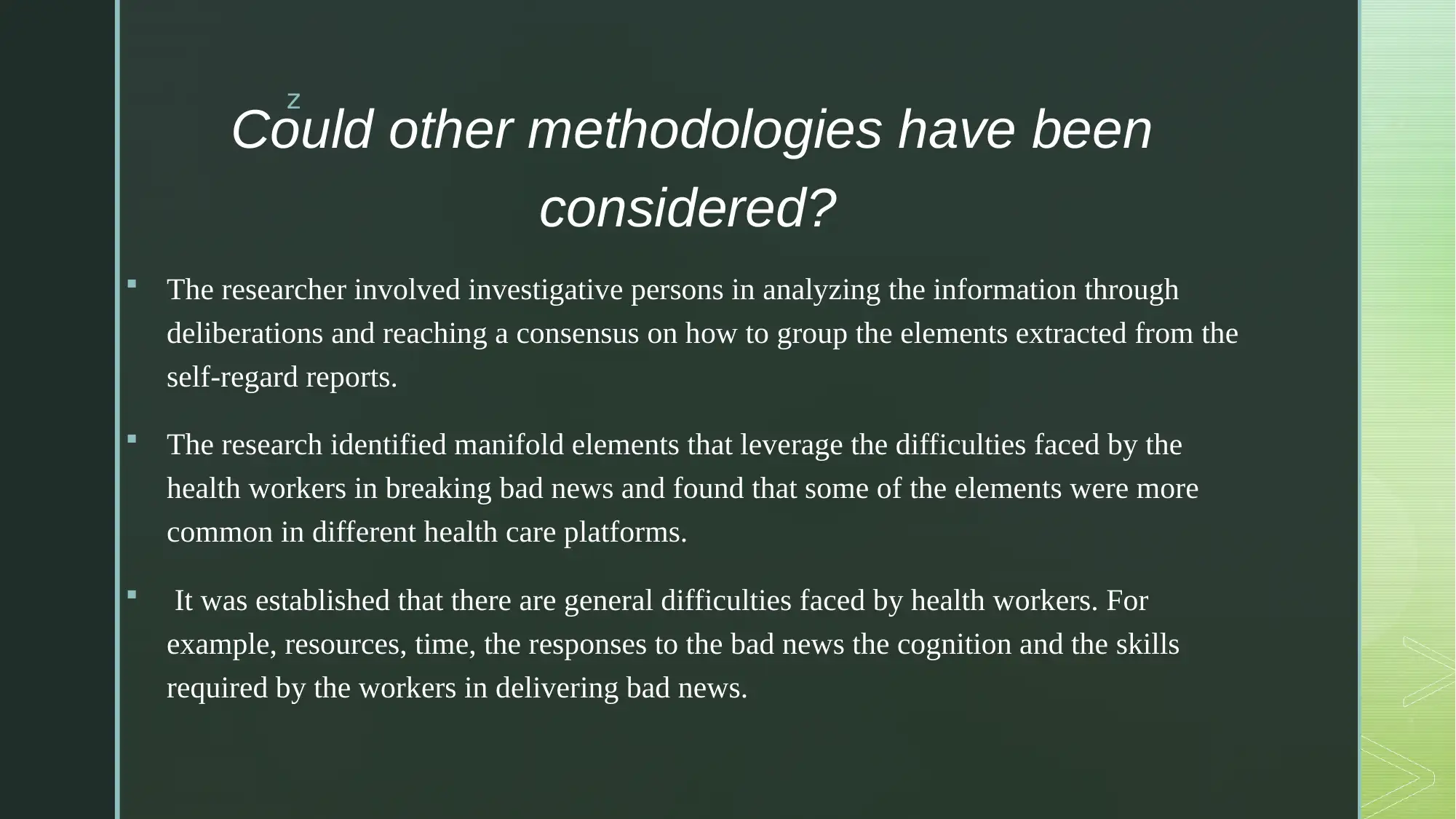
z
Could other methodologies have been
considered?
The researcher involved investigative persons in analyzing the information through
deliberations and reaching a consensus on how to group the elements extracted from the
self-regard reports.
The research identified manifold elements that leverage the difficulties faced by the
health workers in breaking bad news and found that some of the elements were more
common in different health care platforms.
It was established that there are general difficulties faced by health workers. For
example, resources, time, the responses to the bad news the cognition and the skills
required by the workers in delivering bad news.
Could other methodologies have been
considered?
The researcher involved investigative persons in analyzing the information through
deliberations and reaching a consensus on how to group the elements extracted from the
self-regard reports.
The research identified manifold elements that leverage the difficulties faced by the
health workers in breaking bad news and found that some of the elements were more
common in different health care platforms.
It was established that there are general difficulties faced by health workers. For
example, resources, time, the responses to the bad news the cognition and the skills
required by the workers in delivering bad news.
Paraphrase This Document
Need a fresh take? Get an instant paraphrase of this document with our AI Paraphraser
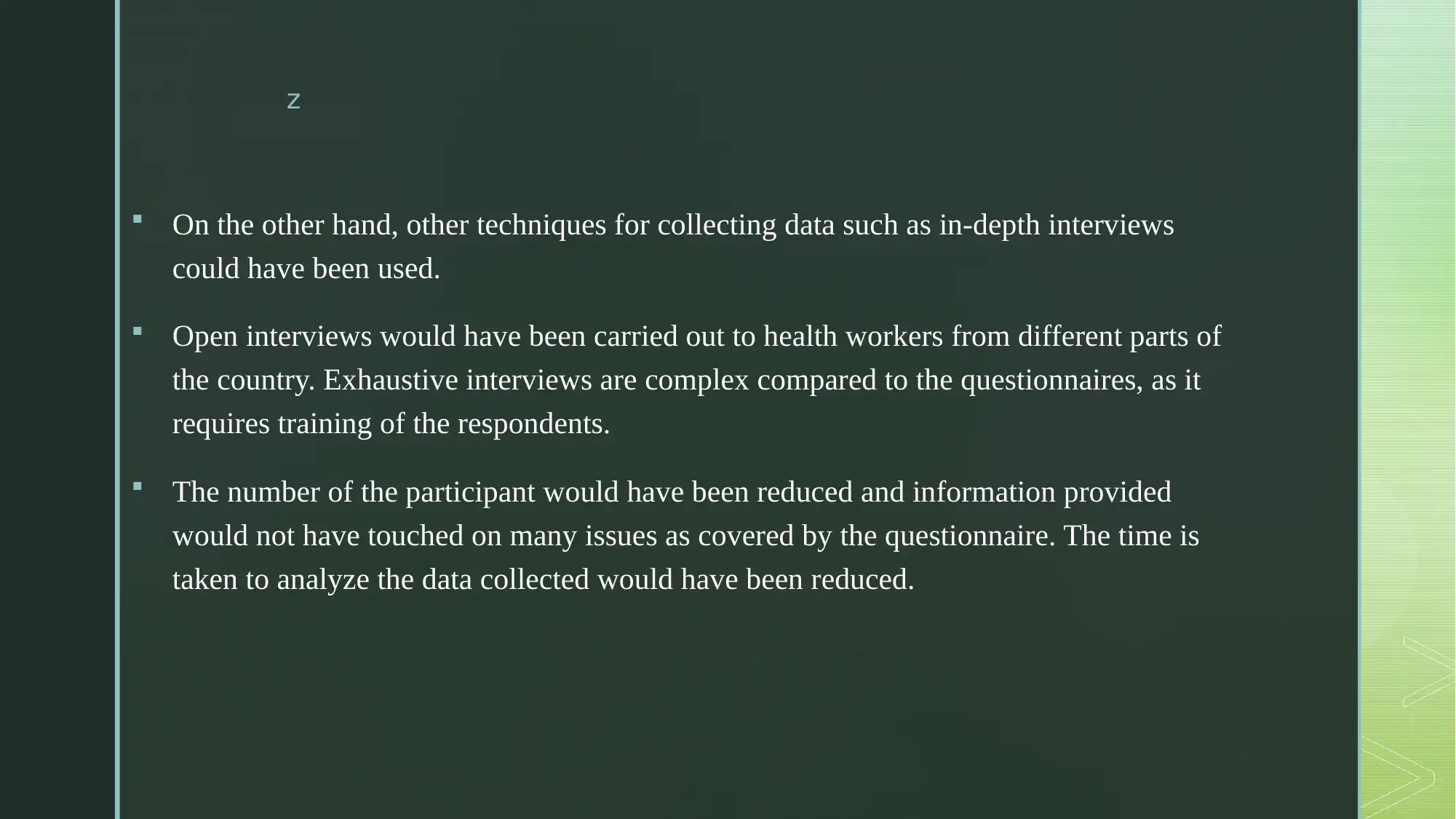
z
On the other hand, other techniques for collecting data such as in-depth interviews
could have been used.
Open interviews would have been carried out to health workers from different parts of
the country. Exhaustive interviews are complex compared to the questionnaires, as it
requires training of the respondents.
The number of the participant would have been reduced and information provided
would not have touched on many issues as covered by the questionnaire. The time is
taken to analyze the data collected would have been reduced.
On the other hand, other techniques for collecting data such as in-depth interviews
could have been used.
Open interviews would have been carried out to health workers from different parts of
the country. Exhaustive interviews are complex compared to the questionnaires, as it
requires training of the respondents.
The number of the participant would have been reduced and information provided
would not have touched on many issues as covered by the questionnaire. The time is
taken to analyze the data collected would have been reduced.
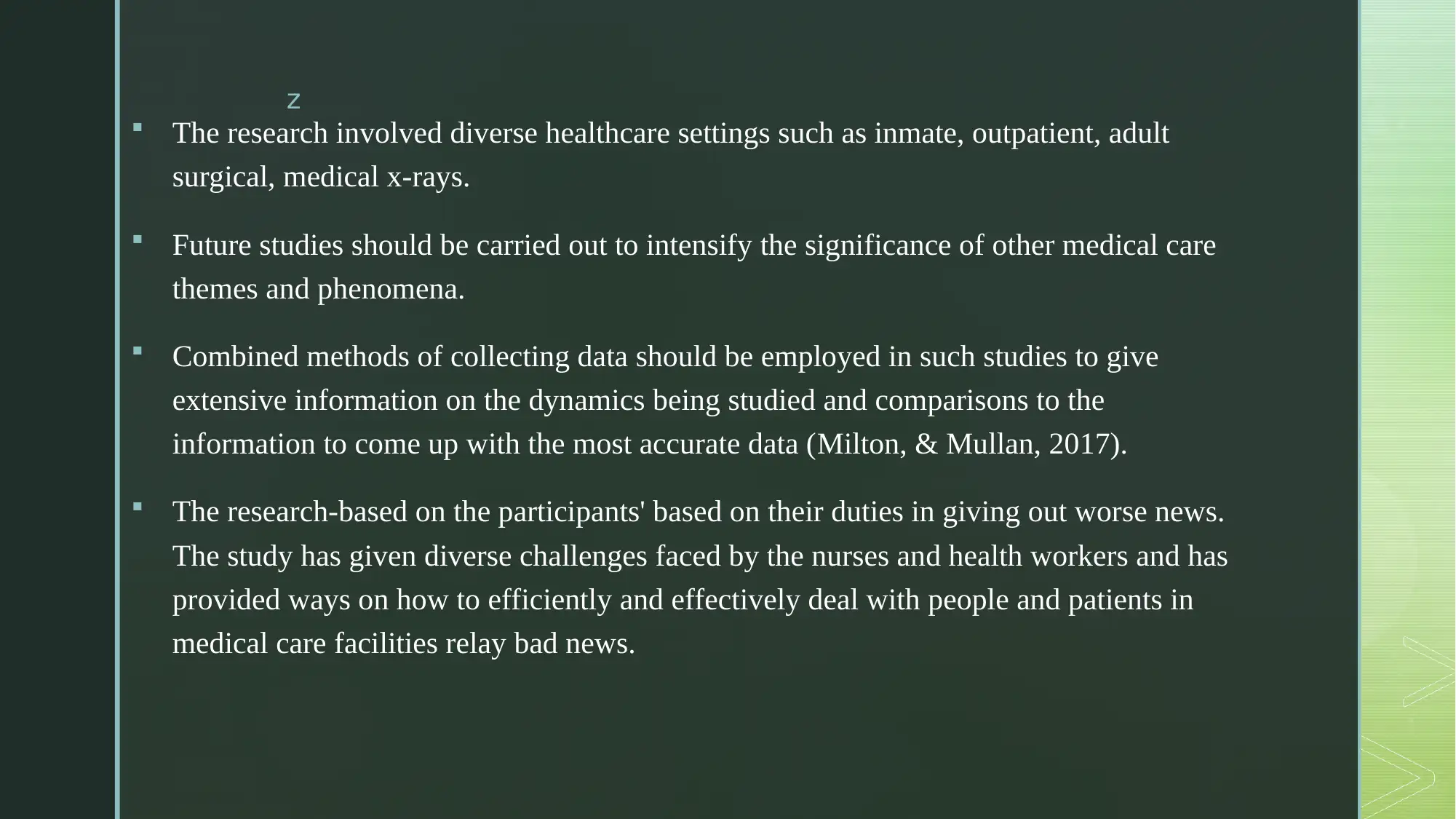
z
The research involved diverse healthcare settings such as inmate, outpatient, adult
surgical, medical x-rays.
Future studies should be carried out to intensify the significance of other medical care
themes and phenomena.
Combined methods of collecting data should be employed in such studies to give
extensive information on the dynamics being studied and comparisons to the
information to come up with the most accurate data (Milton, & Mullan, 2017).
The research-based on the participants' based on their duties in giving out worse news.
The study has given diverse challenges faced by the nurses and health workers and has
provided ways on how to efficiently and effectively deal with people and patients in
medical care facilities relay bad news.
The research involved diverse healthcare settings such as inmate, outpatient, adult
surgical, medical x-rays.
Future studies should be carried out to intensify the significance of other medical care
themes and phenomena.
Combined methods of collecting data should be employed in such studies to give
extensive information on the dynamics being studied and comparisons to the
information to come up with the most accurate data (Milton, & Mullan, 2017).
The research-based on the participants' based on their duties in giving out worse news.
The study has given diverse challenges faced by the nurses and health workers and has
provided ways on how to efficiently and effectively deal with people and patients in
medical care facilities relay bad news.
⊘ This is a preview!⊘
Do you want full access?
Subscribe today to unlock all pages.

Trusted by 1+ million students worldwide
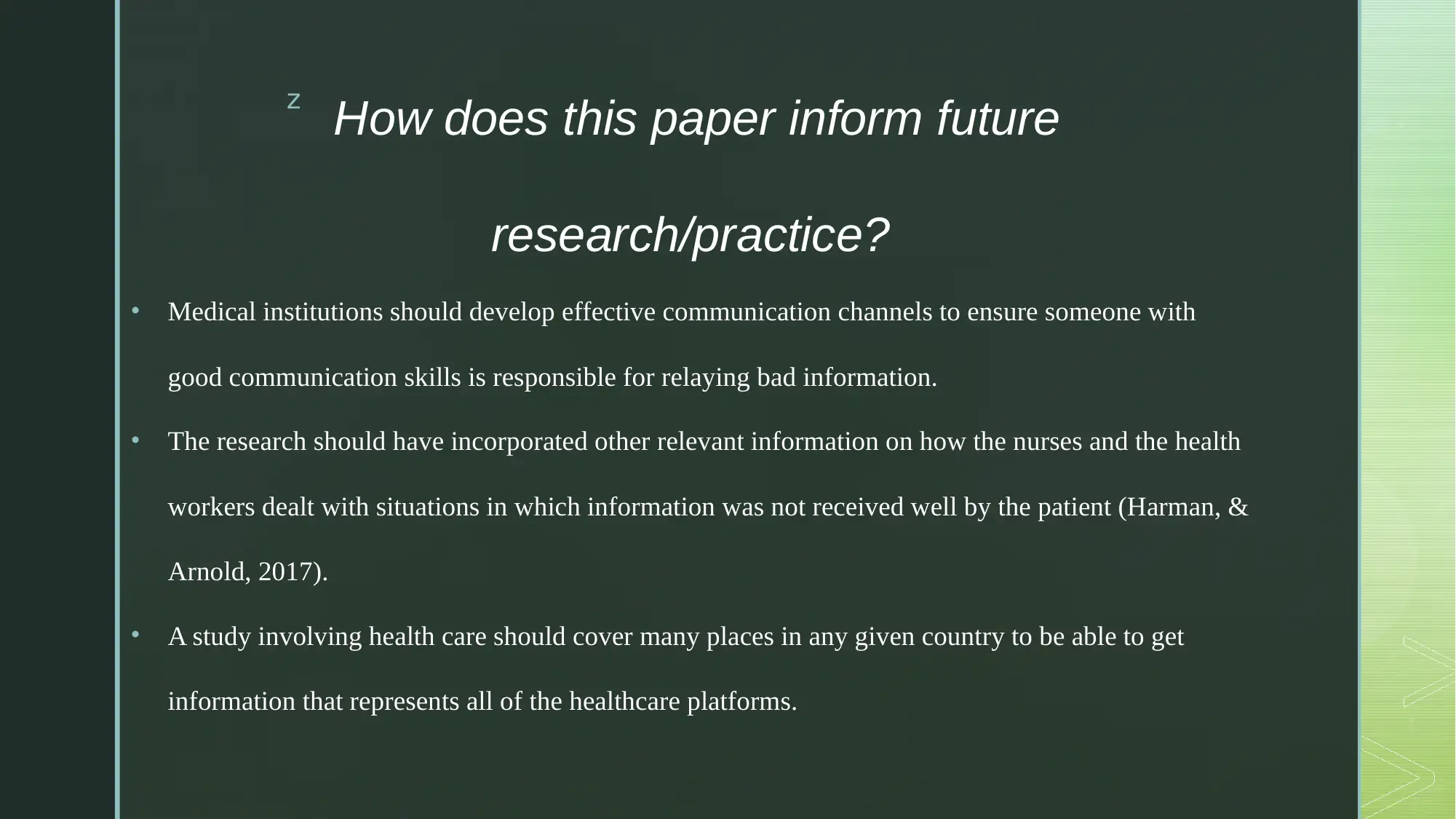
z How does this paper inform future
research/practice?
• Medical institutions should develop effective communication channels to ensure someone with
good communication skills is responsible for relaying bad information.
• The research should have incorporated other relevant information on how the nurses and the health
workers dealt with situations in which information was not received well by the patient (Harman, &
Arnold, 2017).
• A study involving health care should cover many places in any given country to be able to get
information that represents all of the healthcare platforms.
research/practice?
• Medical institutions should develop effective communication channels to ensure someone with
good communication skills is responsible for relaying bad information.
• The research should have incorporated other relevant information on how the nurses and the health
workers dealt with situations in which information was not received well by the patient (Harman, &
Arnold, 2017).
• A study involving health care should cover many places in any given country to be able to get
information that represents all of the healthcare platforms.
Paraphrase This Document
Need a fresh take? Get an instant paraphrase of this document with our AI Paraphraser
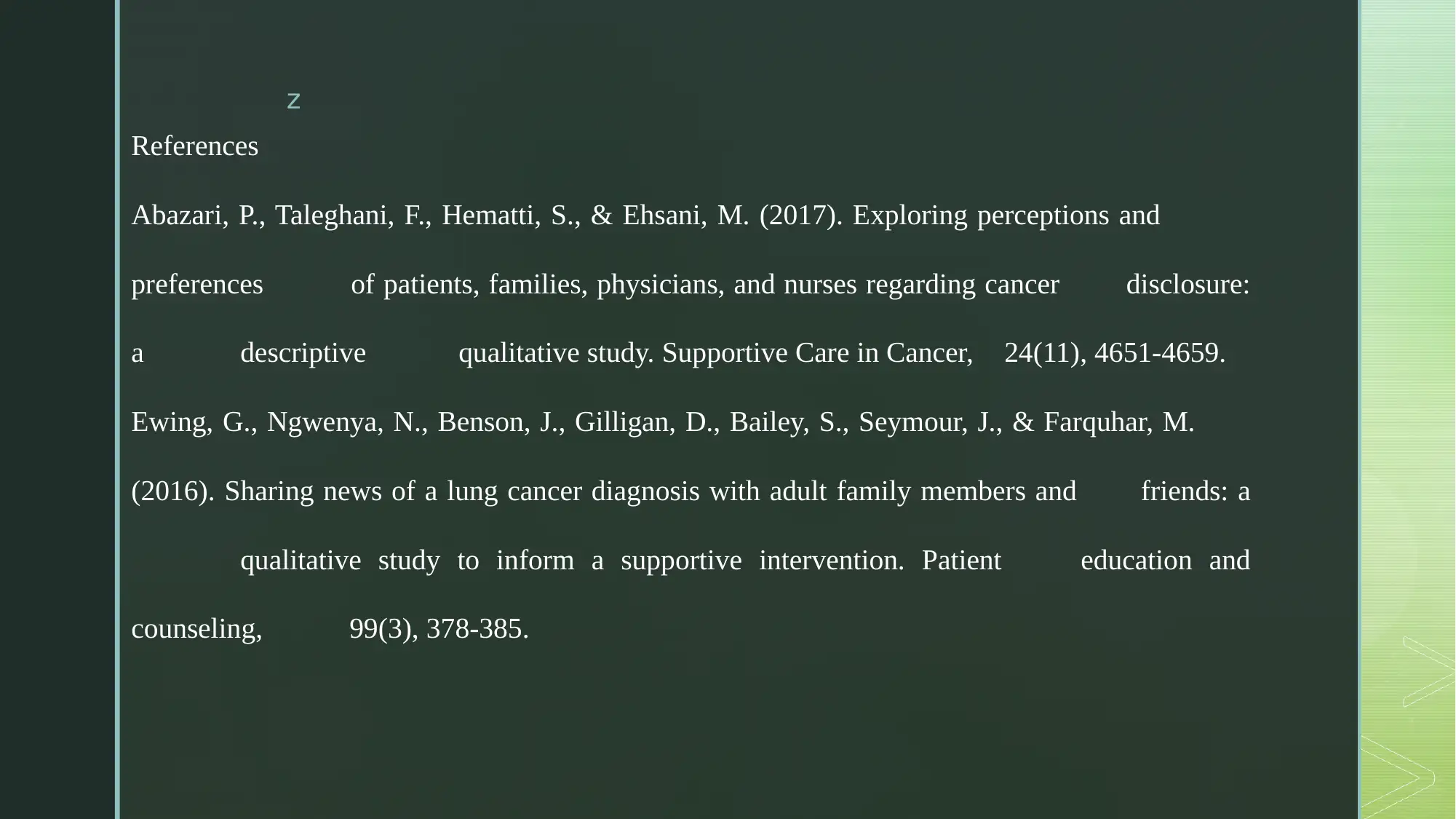
z
References
Abazari, P., Taleghani, F., Hematti, S., & Ehsani, M. (2017). Exploring perceptions and
preferences of patients, families, physicians, and nurses regarding cancer disclosure:
a descriptive qualitative study. Supportive Care in Cancer, 24(11), 4651-4659.
Ewing, G., Ngwenya, N., Benson, J., Gilligan, D., Bailey, S., Seymour, J., & Farquhar, M.
(2016). Sharing news of a lung cancer diagnosis with adult family members and friends: a
qualitative study to inform a supportive intervention. Patient education and
counseling, 99(3), 378-385.
References
Abazari, P., Taleghani, F., Hematti, S., & Ehsani, M. (2017). Exploring perceptions and
preferences of patients, families, physicians, and nurses regarding cancer disclosure:
a descriptive qualitative study. Supportive Care in Cancer, 24(11), 4651-4659.
Ewing, G., Ngwenya, N., Benson, J., Gilligan, D., Bailey, S., Seymour, J., & Farquhar, M.
(2016). Sharing news of a lung cancer diagnosis with adult family members and friends: a
qualitative study to inform a supportive intervention. Patient education and
counseling, 99(3), 378-385.
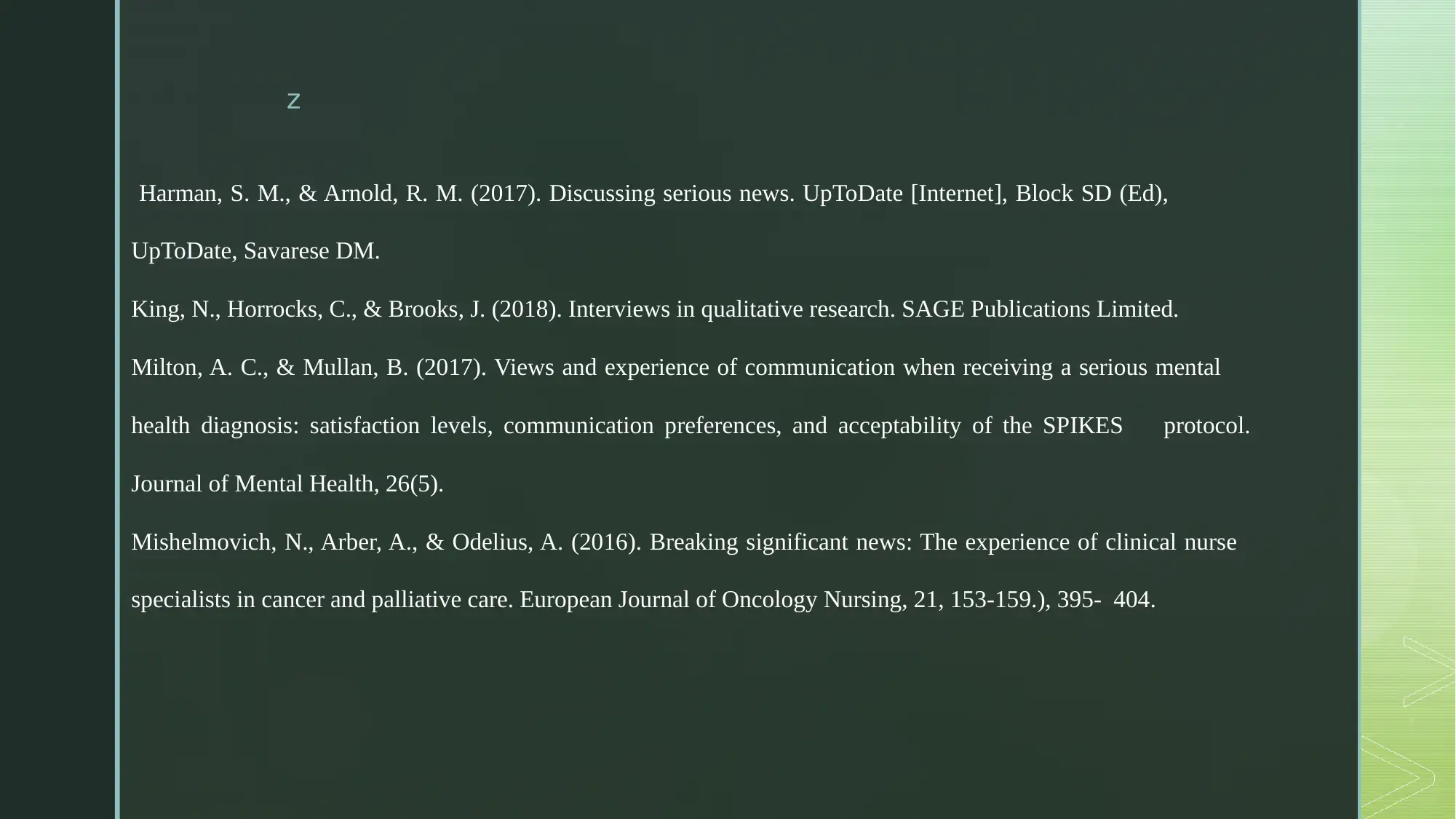
z
Harman, S. M., & Arnold, R. M. (2017). Discussing serious news. UpToDate [Internet], Block SD (Ed),
UpToDate, Savarese DM.
King, N., Horrocks, C., & Brooks, J. (2018). Interviews in qualitative research. SAGE Publications Limited.
Milton, A. C., & Mullan, B. (2017). Views and experience of communication when receiving a serious mental
health diagnosis: satisfaction levels, communication preferences, and acceptability of the SPIKES protocol.
Journal of Mental Health, 26(5).
Mishelmovich, N., Arber, A., & Odelius, A. (2016). Breaking significant news: The experience of clinical nurse
specialists in cancer and palliative care. European Journal of Oncology Nursing, 21, 153-159.), 395- 404.
Harman, S. M., & Arnold, R. M. (2017). Discussing serious news. UpToDate [Internet], Block SD (Ed),
UpToDate, Savarese DM.
King, N., Horrocks, C., & Brooks, J. (2018). Interviews in qualitative research. SAGE Publications Limited.
Milton, A. C., & Mullan, B. (2017). Views and experience of communication when receiving a serious mental
health diagnosis: satisfaction levels, communication preferences, and acceptability of the SPIKES protocol.
Journal of Mental Health, 26(5).
Mishelmovich, N., Arber, A., & Odelius, A. (2016). Breaking significant news: The experience of clinical nurse
specialists in cancer and palliative care. European Journal of Oncology Nursing, 21, 153-159.), 395- 404.
⊘ This is a preview!⊘
Do you want full access?
Subscribe today to unlock all pages.

Trusted by 1+ million students worldwide
1 out of 12
Related Documents
Your All-in-One AI-Powered Toolkit for Academic Success.
+13062052269
info@desklib.com
Available 24*7 on WhatsApp / Email
![[object Object]](/_next/static/media/star-bottom.7253800d.svg)
Unlock your academic potential
Copyright © 2020–2025 A2Z Services. All Rights Reserved. Developed and managed by ZUCOL.




